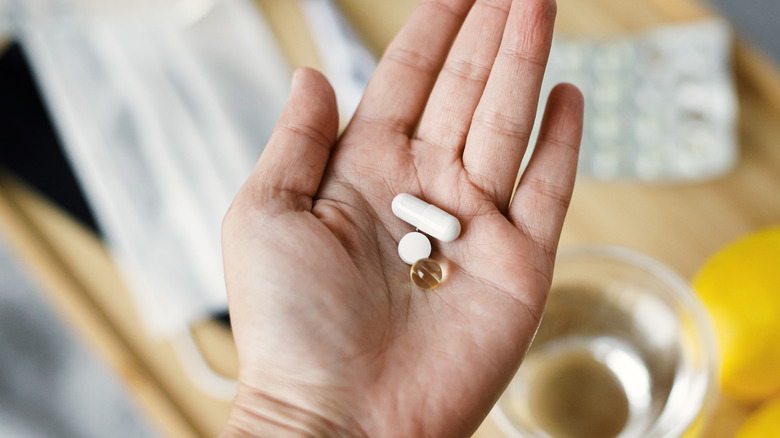Can You Take Vitamins With Probiotics?
We may receive a commission on purchases made from links.
Supplement use has been on the rise worldwide, as an estimated 77 million Americans take them. Experts predict that by 2026, this industry will be worth upwards of $216.3 billion (Health Careers). Supplements are found to be helpful in supporting optimal health, especially in those who have deficiencies, the elderly population, and in pregnant women (via WebMD).
Probiotics are popular supplements that contain live, good bacteria that are essential for keeping a healthy balance in the body. The Cleveland Clinic reports that some benefits of probiotic supplementation include aiding with food digestion, minimizing the growth of bad bacteria, and helping the body break down and absorb medicine.
If you are concerned that taking probiotics along with other supplements may not be safe or might render them ineffective, gastroenterologist Michael Asike, M.D., says not to worry. Dr. Asike tells Good Housekeeping that taking probiotics at the same time as other supplements is generally safe, but they should be taken apart from antibiotics. Board-certified internist Vincent Pedre, M.D., agrees, explaining to mindbodygreen that for maximum effectiveness, it is best to take the probiotic "at least four hours after the morning antibiotic dose or before bedtime, at least three to four hours after the evening antibiotic dose."
Taking probiotics with other supplements can be beneficial
While experts agree that taking probiotics apart from antibiotics is best, there are some supplements that could make your probiotic more effective, and vice versa. Gastroenterologist Will Bulsiewicz, M.D., MSCI, tells mindbodygreen that "There is some evidence that when probiotics are consumed with omega-3 fatty acids, it may actually improve the delivery of the probiotic." According to a study in the Journal of Food Chemistry, a fish or flax seed oil supplement may improve the effectiveness of the probiotic, so taking them together can be beneficial.
Another study published in the Journal of Ovarian Research found that women living with PCOS who took probiotics and vitamin D for 12 weeks showed improvements in mental health.
Furthermore, Dr. Gary B. Huffnagle, Ph.D., professor of internal medicine and microbiology/immunology at University of Michigan Medical Center and author of "The Probiotics Revolution," tells CNN that taking supplements with your probiotics will not alter the effectiveness of them. While vitamins and probiotics are said to be generally safe to take together, consulting with your doctor on your supplement intake is a smart choice.


